General Manager Kyle Dubas met with the media on Friday ahead of the Toronto Marlies’ Calder Cup Final series against the Texas Stars, discussing the success of the Marlies and what it means, the draft combine, approaching the upcoming draft without Mark Hunter, and much more.
In talking to Ben Smith, Colin Greening, Chris Mueller, Vince LoVerde, they all said they wanted to come here to win. How gratifying is it to see it pay off for not just yourself but Sheldon and the players?
Dubas: They’ve been a major part of the team having success. When you talk about success at this level, it’s not just to do with winning; it’s to do with developing. You can speak to the younger guys on the team, and I know most people here have throughout the week, to get a sense of what the impact is of those players. When you’re building a team here in the American league, you’re trying to find veterans that can set an example for the younger athletes that are coming in, both on and off the ice. I think they all bring different elements with their personalities and habit base. They have been terrific for our young people here. They all want to win desperately, so to be in the Finals, for them, is a very gratifying experience. It only helps them in their future here or elsewhere. I’m very, very happy for those guys.
When you brought Sheldon Keefe in, you were excited to see what he could do with the resources of the Maple Leafs. Can you give us the three-year synopsis?
Dubas: I’m very happy for Sheldon. I think he is a very, very talented coach. He continues to get better, much like the players, every day. It’s been a very gratifying experience to see that continued development on his part. I know his future is very, very bright. The thing I have seen him do here is take all of the resources we have on the player development side — on the strength and conditioning side particularly, and with the player development staff and the technical staff led by Scott Pellerin – and just done a great job incorporating that all in. Not only just incorporating it in at large, but with a great purpose. Sheldon and Scott have worked closely on that. To see them do all of that purely for the players’ technical and individual development, I think that is what has helped lead to the on-ice success here of the team.
How much do you subscribe to success at this level bubbling up, hopefully, to the next level?
Dubas: I think it’s tough to use Vegas as an example, but if you use Washington as an example, they put a huge degree of emphasis on Hershey being a contending team year in and year out. You go back through the different teams that made the Stanley Cup in past years – you’ve got Milwaukee and Wilkes Barre in Nashville and Pittsburgh, respectively, and those teams put a huge emphasis on it. Our team here, really since predating me, has been a contending team. Now you’re starting to see that pay off with the Leafs starting to take another turn. I think nobody in athletics tries to be uncompetitive at any level. That’s why the team-building exercise here has been an important one and a great one. I know a lot of times it’s kind of glanced over and you hear from people that it should only be about the young players and about development, but being here and playing in June is a massive experience for the young players on our team and getting them conditioned for that exercise. That is what we want to do with the Maple Leafs. Starting here, now they have this experience they can draw on and that only helps each individual player.
Can you talk about the right balance you’ve struck here with the young players? Liljegren is still getting a lot of time, but you brought in Mueller and those guys for this reason. And here you are now.
Dubas: The thing I look at and I am proud of here is that if you go through it roster by roster, the teams that are in the playoffs and the team that were in the playoffs, when it comes to entry-level players, the Marlies are right near the top in terms of the entry-level players that have played every day. I know that some teams have used that as a criticism of us. It’s frankly BS because if you take the ice time that goes to our young people here versus every other team in the league, we’re right near the top. All of that said, the credit for how all of those young people have been able to take on the minutes that they have and contribute the way they have again goes back to Sheldon and to the older players who have helped them come along, and to those players, who have put in great work with the staff here and put themselves in a position now – June 1st today – to be contributing members on a team. Timothy Liljegren turned 19 during the season. Most players his age have been long done; they’re not eligible to even come close to playing at this stage of the year. He just continues to get better and better each round. It’s been a great experience for him playing here. It’s been very gratifying to see that development.
The combine is going on in Buffalo. What do the Leafs learn that makes the combine valuable?
Dubas: I think it’s an opportunity. I think the players now are very programmed in their answers there. We have tried to invest a lot into finding ways to…. You have 20 minutes with each player that is there, plus you have interaction with them outside the scheduled meeting. You are trying to get a glimpse into what their personality is. You’re not looking to come in and say, “Hey, you’ve got this answer we asked right and this one wrong,” and give a final grade. You learn about them on the ice and you learn about them from talking to their coaches and different people who know them, and then you’re just trying to tie it all together with what they’re telling you when you meet them to try to get a light into what their character and personality really is. That is really what we try to accomplish at the combine. Now they’re doing the physical and medical testing, and that’s above my expertise.
They can take what they learn about their physical and apply it to what you see on the ice?
Dubas: You can learn from what some of the physical limitations of the player may be, but the medical staff will be charged with that. They’ve done a great job. This is the fourth combine since I’ve come here. Every year that I’ve been here for a combine, Jeremy Bettle and his staff with Noah Forman and Paul Ayotte, what they’re able to learn from their testing is of great value to us – not in terms of saying, “This player is going to not be a Leaf,” or, “This one is,” but saying, “Hey, if we draft this player, here is the work we need to do immediately after the draft to get him to reach his potential.” I think it’s of great value to us both on and off the ice. There is no real on-ice portion to it, but off the ice in the weight room and the character.
Are you a believer in off-the-wall questions? If so, do you have a favourite?
Dubas: I think off-the-wall questions… I mean, I left the question creating to people with far more expertise on this stuff than I. We were really just trying to find out about the player’s character and what their personality was. I don’t think anything was off the wall. We tried to get the players to be a little more introspective and find out what intrinsically drives them. I wouldn’t say that anything was really off the wall. We tried to learn about them as a person as much as we could in 20 minutes, which is very tough to do.
You talked about the medical staff. A lot of the time, young players come in and get banged up a little bit because they haven’t dropped into their big paws, you might say. How much credit can you give to this staff for keeping these guys healthy throughout the year?
Dubas: I don’t even think it’s just keeping them healthy. It’s keeping them healthy but also, with the program we have here, it’s putting a program in place. You can’t do this without the buy-in from the coaching staff of having specific days where they’re coming in and they’re continuing to get stronger as the year goes on. You can’t just forgo the physical development of some of your young people to say, “Okay, we’re in the playoffs now. We’ll drop that piece and pick it up in July.” It’s continuing it on so we are setting these people up for their summer to come back in again next year. It’s not only a credit to keeping them healthy; it’s getting them stronger as the year has gone on and they’ve done a great, great job here. They’re a huge, huge part of our team.
What would winning a Calder Cup mean for you personally?
Dubas: I never really thought of that, honestly. Maybe as we get going here, it’ll come more in focus. I’d be thrilled for Sheldon; not only Sheldon, but the people who are around the team every day here… the media people, the people who run the building, our leadership group, our equipment staff – those people who extremely hard all year. I have a relatively cushy job compared to them. They do a lot of hard work. So for me, it would mean a lot to see how happy they would be after working so hard for so long.
I think it would be great for the city, obviously, and great for the organization. Personally, I would benefit from it because of the experience it has given to people here winning and doing my job with the Maple Leafs.
In terms of my personal thoughts about it – I guess I’ve been distracted a little bit and not thinking of it of late, but as we get going here tomorrow, it’ll come into focus. Obviously, that’s our goal here this series.
Would it be the peak of your career to this point?
Dubas: I don’t know. I don’t know what the peak of my career would be. I would be thrilled. I think it would give validation to a lot of the processes people have questioned, whether it was in Sault Ste Marie or here. I think it would just eliminate one more question from the pile. If we can get to no questions left, that would probably be great. We probably have a much larger task ahead to get there, but I would be happy for the people that have been along for the ride. I would be really happy for the families of the people here and my own family because it’s a long journey and a long season. They go along with you for it every step of the way. It’s not just you that does it; it’s your family and friends. It would obviously be exciting and I would be happy for them because they share in it as well.
How are you and your team feeling heading into the draft without Mark Hunter being here?
Dubas: I think the circumstances are what they are. It’s unfortunate, but it’s like anything. Since that decision has come down, we’ve just moved straight ahead with it. I was really happy with the staff during the whole week in Buffalo. I thought every member that we had there did a great, great job right away getting focused. We had meetings at the beginning to try to set the tone of what we wanted to do. They had a meeting today without me there to kind of chart the course for the next few weeks ahead. I feel very, very good about our preparation and our process we have in place. It’s always a big day for any organization. Right now, we’ll have an opportunity to add seven more potential Leafs to our organization. It’s very exciting.
You’ll be heading up the process at the draft?
Dubas: I don’t want to say heading up. I’ll be working with our area directors and with our assistant GMs, with Brandon Pridham and Laurence Gilman, and it’s an all-encompassing approach here. That is just the way I like to do it. We’ll bring everybody involved. We’ll narrow our focus here in the coming weeks and then we’ll push ahead in Dallas.
Are there any roles you’d like to see filled sooner or later in the front office?
Dubas: I feel good about the front office right now. Interacting with everybody there for the first time this week, it was very good to see everyone kind of came together. If you can improve, you’re always looking to. We’ll look at that once we get through the draft. There won’t be anything imminent here in the next number of weeks.
Brandon and Laurence – what have they meant and what do they add to the organization?
Dubas: Brandon has been here for four years, so I know his expertise and what he brings every day. He is outstanding at what he does – not only the contracts and salary cap and league matters, but just in his process and what he thinks about hockey. He will openly disagree with me, which I’ll always appreciate. Oftentimes, when I get going down the wrong road, I want people who can tell me, “You’re going to be dead wrong here.” It makes me stop and think. Brandon and I have that relationship, which I think is great.
Laurence has been here now for a few weeks, and he is just kind of getting his feet wet. He is going to move from Vancouver to here. But he’s got a lot of experience in hockey with a number of different organizations and roles. So far, the way that he thinks and his process, he is very different and open in his dissent with me and with others. That’s what I love. It’s respectful. “This is how we did it and this is how we should change,” and so on an so forth. It’s been a great dynamic so far. I’m sure, as he gets more comfortable in these roles, it’s only going to get better.
There were some questions earlier about what this run has meant and does for the organization. Do you have a ballpark number in mind of how many guys from the ice out here that you can see making the Leafs?
Dubas: I think that’ll be decided in training camp. It’s hard to predict the way things are going to go in the summer – different transactions, and things of that matter – but I think a lot of players have opened a lot of eyes in the organization through the run. Rather than, “I’m amazed he’s going to have to go back to the Marlies next year,” next year they start to say, “We’ve got to give him a bigger look in training camp and give him more exhibition games.” That’s what these guys have earned. They have earned that ability through their play with this run. What it’s done has really broadened our horizons and our depth and the scope with which we are going to filter the organization into training camp and the different opportunities people have. That’s exciting. These guys have earned it.



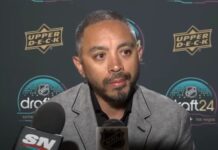



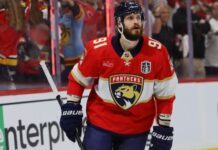


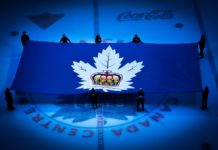

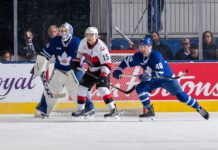
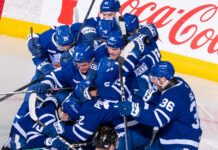

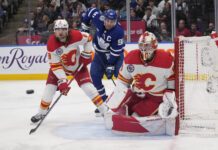


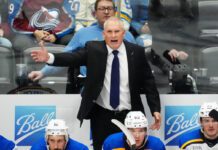


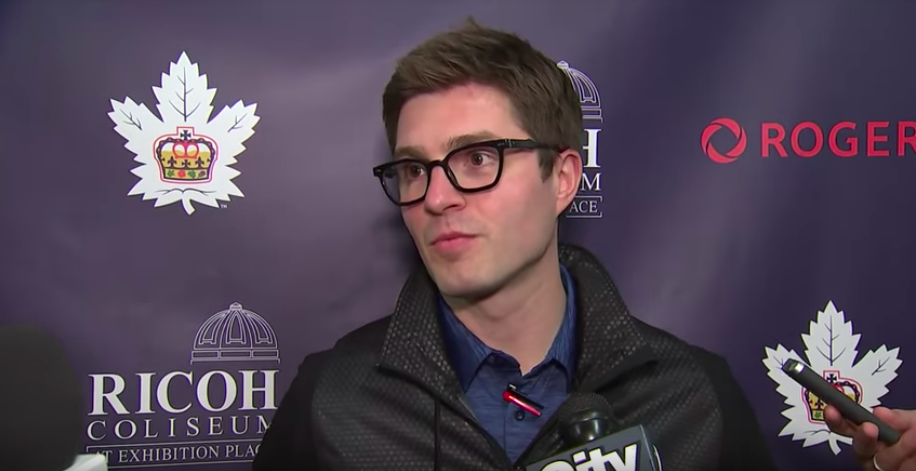








![New Leaf Anthony Stolarz on the opportunity in Toronto: “In Florida, I knew my role as a backup… Now, [Joseph Woll] and I are competing for starts… As a goalie, that’s all you can ask for” Anthony Stolarz, Stanley Cup win, now Maple Leaf](https://mapleleafshotstove.com/wp-content/uploads/2024/07/anthony-stolarz-sc-100x70.jpg)
